An Interview with Viswanathan Anand
New York City 1995, Tehran 2000, Mexico City 2007, Bonn 2008, Sofia 2010, Moscow 2012, Chennai 2013, Sochi 2014 — these are the World Chess Championships that Viswanathan Anand has fought in his career. But it was only in 2007 that the world witnessed the coming of the Anand era. He has played in every title clash since he won the title in Mexico, except the ongoing match. But Anand had been busy of late winning the Champions Showdown multi-format tourney ahead of Caruana, Nakamura, and Topalov. Albert Silver brings us this exclusive interview with the champ where he talks about the future of chess and expresses his feelings on the ongoing world championship!
An Interview with Viswanathan Anand
By Albert Silver
A man was trying to sell a spear and a shield at a fair in China. When people asked him how good his spear was, he said that his spear could pierce any shield. Then, when asked how good his shield was, he said that it could defend from all spear attacks. Then one person asked him what would happen if he were to take his spear to strike his shield; the seller could not answer.
Magnus Carlsen is taking on Sergey Karjakin at New York City in the battle to determine the world's best chess player. In this bygone decade alone, a challenger has taken the lead in a championship match more than once. In 2010, Topalov drew first blood, and in 2012, Gelfand went ahead to win the first victory. In 2013, Carlsen himself defeated Anand first.
For the first time since Mexico 2007, Vishy Anand is not competing for the world title. One would wonder how Anand must be feeling about watching the games as a spectator for the first time in nine years. What was Vishy up to this month?
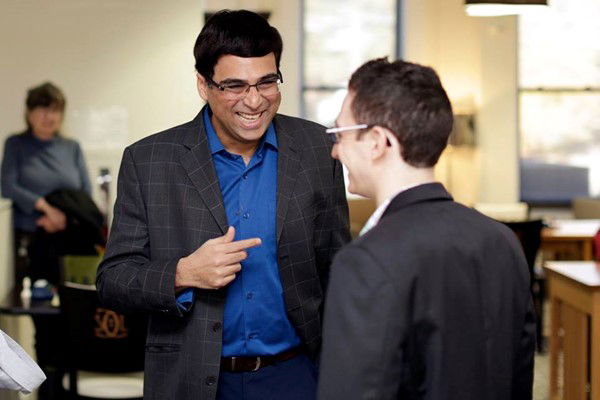
ChessBase India Exclusive:
ChessBase editor Albert Silver interviewed Viswanathan Anand today and he brings you the insights of the five-time world champion. Albert and Vishy carefully discuss the future of chess and the ongoing Carlsen-Karjakin match.
Albert Silver: Hi Vishy, thank you for taking the time to speak with me and ChessBase readers. First of all, congratulations on your wonderful result at St. Louis.
Viswanathan Anand: Thanks a lot. (Note: Questions in bold).
Saint Louis – Champions Showdown and the Future of Chess
It was really an epic win. Obviously, everyone was rooting for you and hoping for a great result, but the different time controls made it unclear whether you would be able to shine, since of late your classical chess has been your strongest suit. How was it playing such varied time controls?
It’s better now than say, two years ago. I think at some point in 2014 I realized I had not played a rapid game in… who knows how many months or years. I think it was in Zurich in 2014 that I really felt at sea. I was amazed at how I had practically forgotten how to play. Recently, thanks to the World Rapid and Blitz, and Leuven and Leon, I do get some rapid chess in and some blitz in, so it wasn’t too bad. Yes, I was cautious about my chances, and these days I am more realistic about my chances in rapid and blitz, but given that I went into it cautiously it went like a dream.
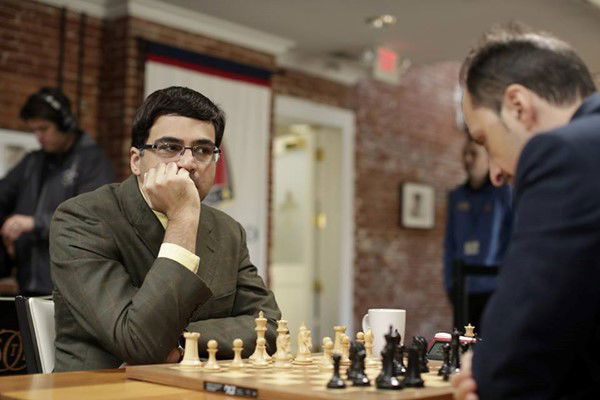
The format used in St. Louis, mixing multiple time controls, is one that is becoming increasingly popular: classical, rapid, and blitz in this case, much like Zurich. However, there was one little twist, the rapid and blitz games in St. Louis weren’t weighted. They were given equal value to the classical games. How did you feel about that?
Before the tournament I hadn’t thought about it too much, and it struck me at the players’ meeting that we had twelve blitz games, which would take place in one day, and we’d have six classical games that would take three days, and I realized we’d be spending 80% of the tournament’s duration on just 50% of the points. Having said that, it actually worked out well for me. Consider that Hikaru (Nakamura) overcame a one-point lead over me once in five rapid games in Zurich, whereas here he didn’t overhaul a 1.5 point lead in 12 blitz games, so I can’t really complain. In fact in the rapid, my lead increased by a point.
Although I don’t have a hard and fast opinion on the matter, I and the participants felt that weighted games were the way to go.
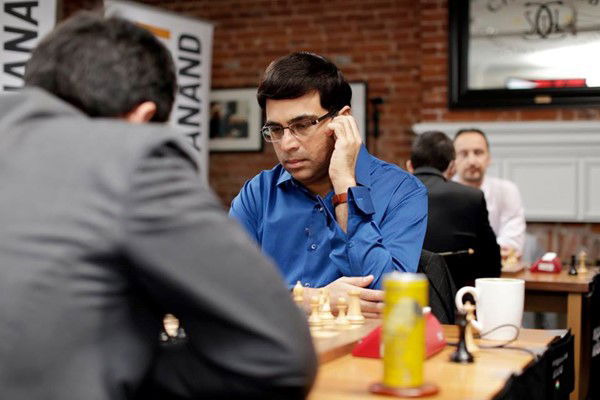
Kasparov appeared on the commentary one of the days, and explained, rather surprisingly to many of the viewers, that now he saw rapid games as the way of the future, and that classical chess, while it might continue to exist, would take a backseat. Do you agree with his assessment?
(Laughs) Well, Hans Walter Schmidt (the organizer of the Mainz Chess festival) will be very happy to hear this. I’m not so categorical. I feel it will go back and forth. As a spectator, I very much enjoy watching a rapid tournament and after that, I enjoy watching a classical one, and it is the ability to change the experience I enjoy. While I think it goes back and forth, I think that mixed formats will get more and more popular, and that I agree with very much. There is something about mixing the format and making it slightly more unpredictable that makes the tournament more interesting. I think that could, in fact, be a trend. Also, classical games will get shorter (2-3 hours).
New York – World Championship
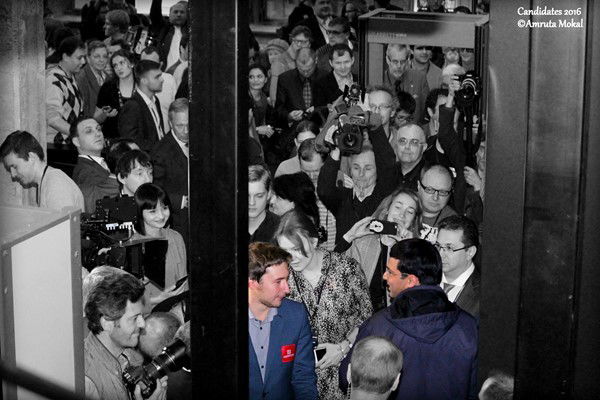
Speaking of classical chess. The world chess championship is now well underway after eight games. The first seven were draws, and the eighth game, to the surprise of many, was a win for Karjakin, who has taken the early lead. What have you thought about the match so far?
The one thing that I felt after game six was that the tension was rising. Even though it might look like nothing was happening, the fact that there were fewer games left meant that the cost of a mistake is higher, and your time to recover is obviously less. The impending end of the tournament heightens the tension. It was clear to me the deadlock would break at some point, but it was dramatic. It is one of the reasons I would not rule out classical chess since it does produce very exciting moments like this. I have watched some of it live, and I imagine that watching it live there must be absolutely gripping. (Note: Anand is currently in Chennai, which is 10.5 hours ahead of New York).
Having said that, I still think the match could go either way. Karjakin only has a one-point lead, and it only takes one win and Magnus is back in the match. It’s not the same thing as if you had never had a lead, or you had a lead and gave it up, so even if they go back to even, the psychological situation will have changed profoundly. Still, all things considered, Sergey would obviously prefer to have the lead than not. So you can almost feel the tension, it is the last few games, and let’s just see how they play. Both of them have to deal with the new situation, and Magnus is resourceful, so let’s see what they can do. I don’t have any special insight, but both of them are experimenting, and that makes it nice.
What have you thought about the opening preparation so far?
I would say Magnus has won the opening battle such as it is. He has equalized with black a lot easier than Karjakin has, but even there I think it isn’t so much that he won the opening battle as it is that he was able to exert more pressure in a couple of games. I think that he must feel he has missed a couple of good chances, to put it kindly. By now it almost feels like opening preparation is irrelevant to this. For me, right now nerves are a bigger factor. My prediction is that Carlsen will aim for a surprise over opening victories. If he can catch Sergey in something unfamiliar that’s what he will aim for.
You saw that in game eight that both of them were really struggling to find their way around. The thing about getting unfamiliar positions is that while it’s nice to take your opponent out of his preparation, you are also taking yourself out of your comfort zone.
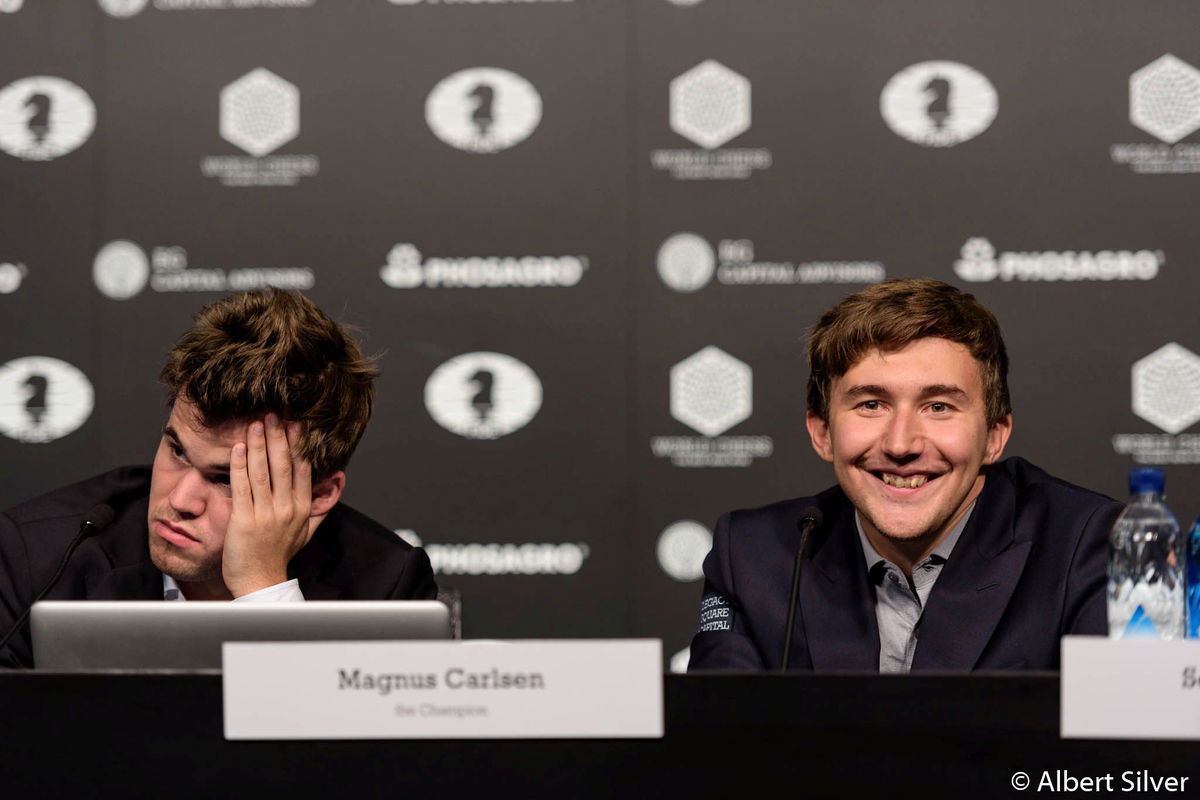
Do you think this favors Carlsen more than Karjakin, regardless of the result?
The opening itself could have gone either way. If you take one you have played a hundred times, the variations come easier to you. However, if they keep doing this, it will be very difficult for both participants to go on autopilot, and this is probably what Magnus will aim for. Karjakin will be forced to try to prepare for all this and spread himself thin, so let’s see.
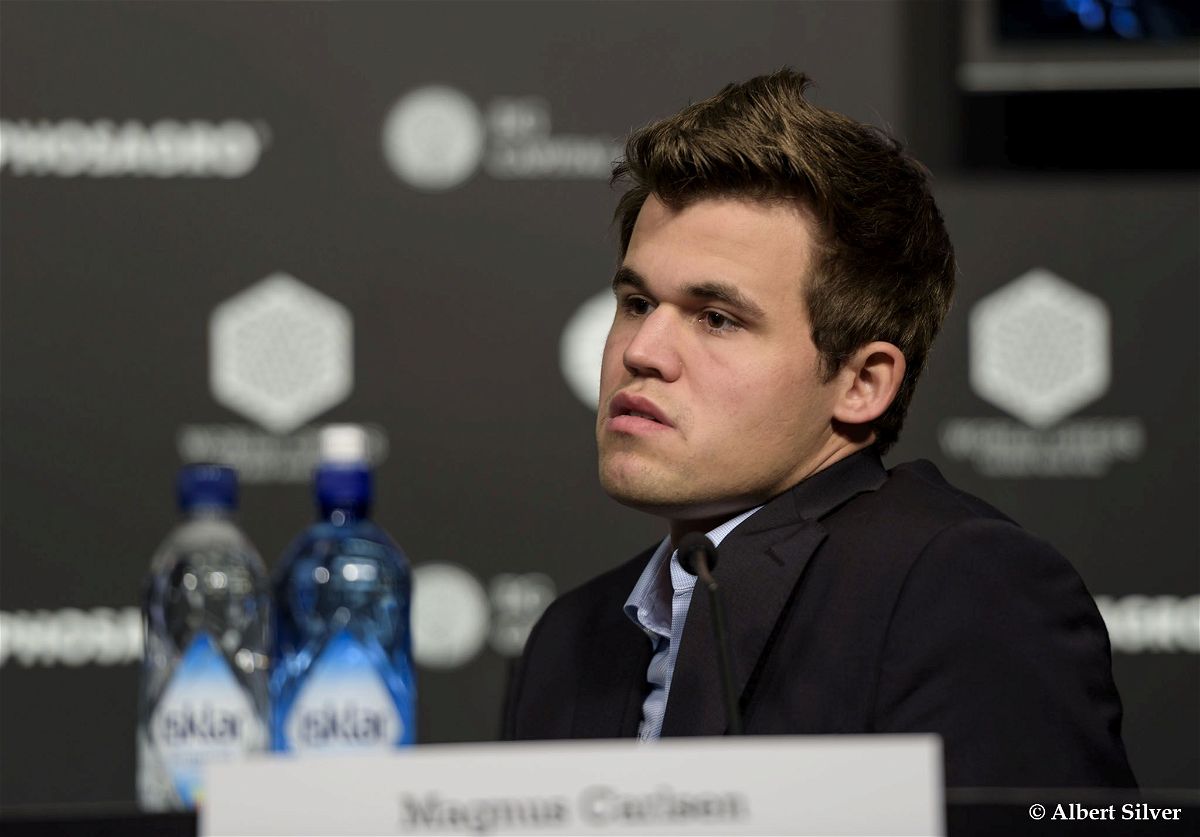
In the press conference, Magnus came in early and obviously still distraught from the game, ended up leaving before it started. Do you think this might affect him in the following game?
It shouldn’t, but you know, it’s funny. When I saw the footage on YouTube with Magnus sitting there at the press conference waiting for it to start, and Sergey outside… that brought back the most strongly my memories of playing world championships.
How so?
Just how emotionally draining it is to win or lose. For a second, I felt like it wasn’t Magnus who was sitting there at all, waiting for the press conference to start, I felt like it was me. I can’t explain it, it just felt very vivid. I have been in the situation often enough that I remember all the emotions I felt and it’s tricky. I know the feeling: you’ve lost a game, and though not all losses are the same, but a loss like this is draining and waiting for a press conference to start, the minutes feel like hours.
Still, I think the rest day should cure it, especially if you get a good night’s sleep, and you accept that the situation has changed and you have to deal with the new one. I think Magnus will get over it. You will be extremely upset for ten minutes after the game, but already by the evening you are halfway down the path to recovery, so I don’t see that as a big factor.
This is also precisely why I think that after a loss, it would be nice if the loser could just make a short statement, answer a couple of questions and be let go rather than forced to stay seated there. I kind of knew how Magnus felt, and I don’t know what it is like in other sports, but for a chess player, it is overwhelming.
Going into the last four games, the pressure is on Carlsen as he is the champion and the rating favorite to be ahead, which is not the case. Do you think this adds to the pressure and make it more difficult for him?
Yes, and what does that mean? I think that as long as you are in the frame of mind to play chess, the emotions will deal with themselves. If you get a chance, everything will feel fine right away, and if you don’t it is different. Also, it will be equally difficult for Sergey. He can pretend it is all the same as before, but deep down he knows that he is leading, and in the end of the day we are all human and we can’t help from this sort of thing messing with our brain. Both of them will have to deal with a lot of issues in the next few games.
I would guess that in game nine, or at the latest by game ten, they will be settling into the new situation, but game nine is probably when it is going to be the most intense.
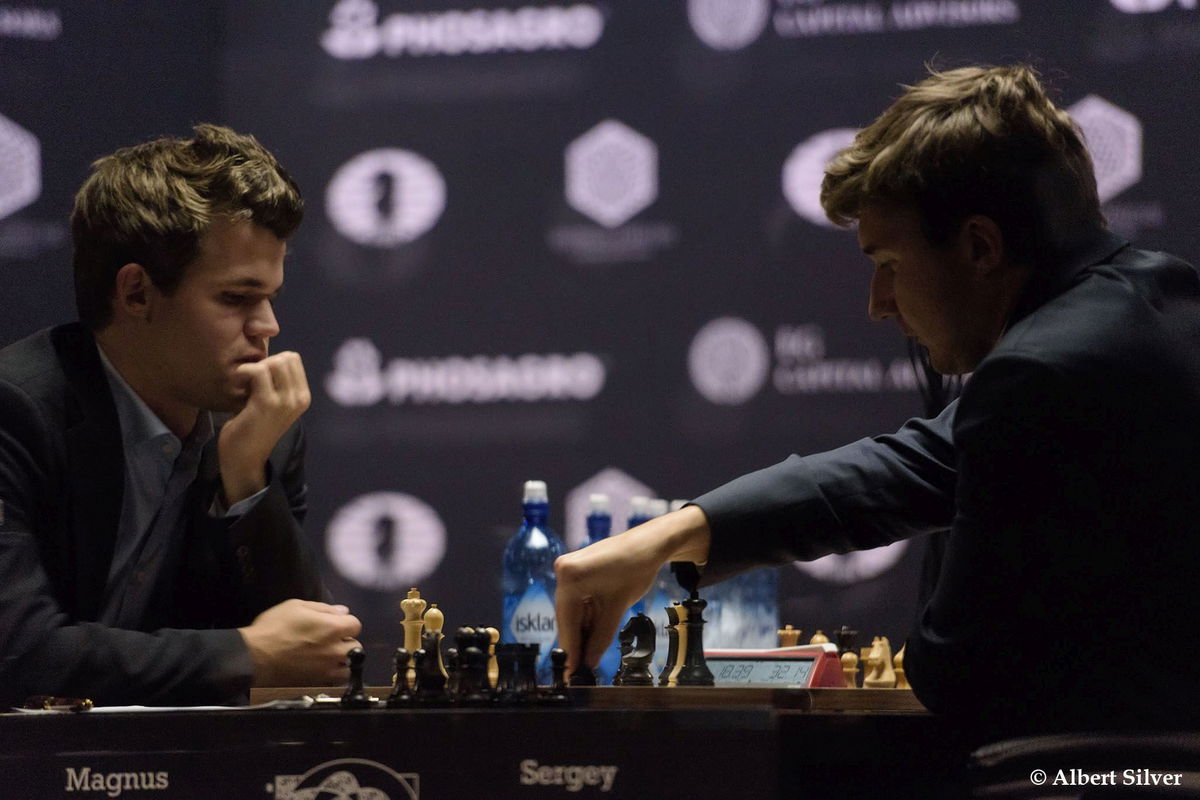
So the next round, game nine, is the one you think will be key to the match?
No, I wouldn’t say that. I meant that both of them need to adjust to the situation: Magnus to the unfamiliar situation of being behind with few games left, and Sergey to all the thoughts of suddenly being in the lead. Once game nine is over those feelings will subside, but the task of playing a good game of chess will still be upon them. That’s the thing, though: there are still four games left and these are not ordinary games. These will be quite tense and they have a lot on their plates.
If you were on Carlsen’s team or Karjakin’s team, what would you recommend in terms of game approach to reach their goals in these last crucial games?
The usual stuff, play long games. But I don’t have any advice that other people won’t have already given them. I’m really just going to sit back and enjoy this as a spectator.
Albert Silver
Born in the US, he grew up in Paris, France, where he completed his Baccalaureat, and after college moved to Rio de Janeiro, Brazil. He had a peak rating of 2240 FIDE, and was a key designer of Chess Assistant 6. In 2010 he joined the ChessBase family as an editor and writer at ChessBase News. He is also a passionate photographer with work appearing in numerous publications.
Like our Facebook page for more such updates:
Related:
- ChessBase India's recent interview with Vishy Anand
- ChessBase India's reports on the Champions Showdown
- ChessBase India's World Championship report

